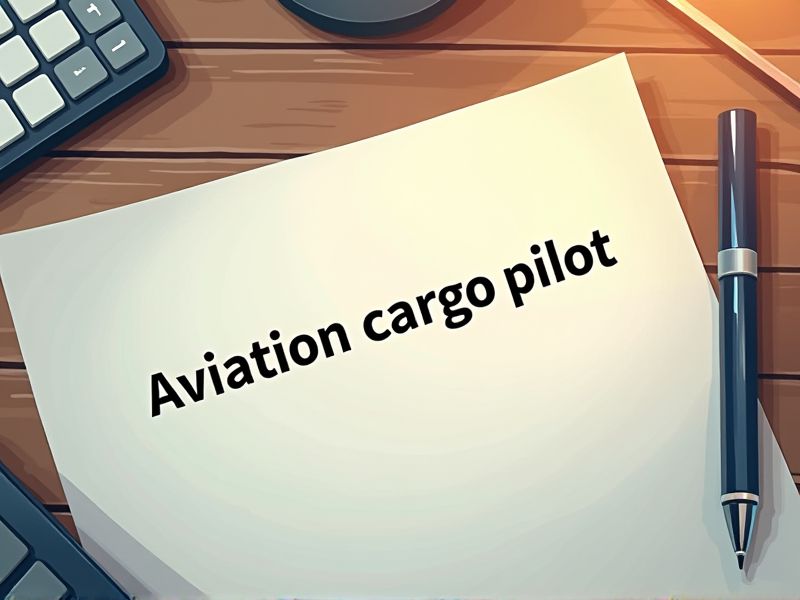
Aviation cargo pilots require specific certifications due to the nature of their responsibilities, which involve transporting sensitive and high-value goods. The process ensures that these pilots possess the necessary skills to handle emergencies, navigate complex air routes, and comply with stringent safety regulations. Certifying pilots also serves to maintain high industry standards, minimizing risks associated with aviation logistics. Some critical certifications you may need for a career as an aviation cargo pilot include.
Airline Transport Pilot (ATP) Certification
Airline Transport Pilot (ATP) Certification is required for aviation cargo pilots due to FAA regulations mandating the highest level of pilot certification for operating large aircraft. This certification ensures pilots have substantial flight experience and comprehensive aeronautical knowledge, critical for managing cargo flights which often deal with complex flight conditions. Cargo pilots frequently operate during nighttime or adverse weather, necessitating advanced skills and decision-making capabilities that ATP certification underscores. Airlines also seek ATP-certified pilots to guarantee safety, liability insurance compliance, and operational efficiency in their cargo divisions.
Commercial Pilot License (CPL)
Aviation cargo pilots require a Commercial Pilot License (CPL) because it certifies their proficiency in handling complex aircraft systems essential for cargo operations. The CPL ensures the pilot meets stringent safety standards set by aviation authorities, which are crucial for operating large cargo planes. The license involves extensive training, which equips pilots with the necessary skills to manage varied cargo loads and adverse weather conditions. Regulatory requirements mandate a CPL for pilot roles because it guarantees that individuals have undergone rigorous testing and are capable of maintaining the high operational standards demanded in cargo transport.
Instrument Rating (IR)
An Instrument Rating (IR) is essential for cargo pilots as it allows them to fly in various weather conditions, ensuring timely deliveries regardless of visibility. The IR qualification enhances a pilot's skills in operating solely on instrument signals, crucial for nighttime or low-visibility flights often encountered in cargo operations. Federal Aviation Administration regulations mandate IR for commercial pilots to ensure that they can safely navigate complex airspaces. The ability to fly on instruments increases operational flexibility, expanding the range of possible cargo missions and improving service reliability.
Multi-Engine Rating
A multi-engine rating is crucial for aviation cargo pilots because it equips them with the skills to operate aircraft with multiple engines, which are commonly used in cargo operations due to their higher payload capacity. It ensures pilots can handle engine failures more effectively, a scenario more likely in multi-engine cargo planes, thereby enhancing safety. This rating also broadens employment opportunities, as many cargo airlines prioritize hiring pilots adept in multi-engine aircraft to meet their operational demands. Cargo pilots with multi-engine training can optimize fuel efficiency and manage complex flight dynamics, crucial for cost-effective and reliable cargo transport.
Aircraft Type Rating
The aircraft type rating is necessary for aviation cargo pilots because it certifies their competence to operate specific aircraft models, ensuring safety in diverse operational conditions. Different aircraft have unique systems and handling characteristics, requiring specialized training to prevent accidents. Regulatory authorities mandate type ratings to maintain standardized proficiency across pilots, thus reducing the margin for error. The complexity and technology of aircraft continuously evolve, necessitating updated training for pilots to effectively manage new features and systems.
FAA Medical Certificate (Class 1)
Aviation cargo pilots require an FAA Medical Certificate (Class 1) to ensure they meet the strict health standards necessary for safely operating an aircraft. This certification involves comprehensive medical evaluation, helping to prevent incapacitation in high-pressure flying situations. Holding a Class 1 certificate reassures employers and regulatory bodies of the pilot's physical fitness and ability to handle the demanding nature of cargo flights. Regulatory compliance mandates this certification to uphold safety standards across the aviation industry.
Dangerous Goods (DG) Certification
Dangerous Goods (DG) Certification is essential for aviation cargo pilots because it ensures they understand how to safely handle hazardous materials, minimizing risks during transit. This certification educates pilots on legal and regulatory compliance, preventing costly fines and legal repercussions. Proper training reduces the likelihood of accidents caused by incorrect handling or stowage of dangerous goods. It also equips pilots with the knowledge to respond effectively to emergencies involving hazardous materials, ensuring passenger and crew safety.
Crew Resource Management (CRM) Certification
Crew Resource Management (CRM) Certification is essential because it enhances teamwork, communication, and decision-making skills critical for cargo pilots, where coordination is crucial despite working in smaller teams. Aviation cargo pilots often encounter varied and unexpected challenges in-flight; CRM training equips them with strategies to manage these situations effectively. The certification standardizes procedures across diverse crews, reducing the risk of mishaps due to miscommunication. CRM also reinforces pilots' situational awareness, which is vital in managing the unique demands of cargo operations.
Aviation Safety Management System (SMS) Training
Aviation SMS training enhances a cargo pilot's ability to identify and mitigate potential safety hazards, which reduces accident risks. Understanding safety protocols through training ensures compliance with international aviation safety standards, fostering a safer operational environment. The complexity of cargo logistics demands that pilots are adept in quickly assessing and responding to unexpected safety threats. Continuous SMS education empowers pilots to consistently improve safety practices, adapting to ever-evolving aviation challenges.
Aviation Security Awareness Certification
Aviation Security Awareness Certification is essential for cargo pilots to ensure they can identify and mitigate potential security threats specific to their operations. Understanding security protocols helps cargo pilots prevent unauthorized access to aircraft, protecting valuable cargo. A thorough knowledge of security measures enables pilots to comply with international and domestic aviation regulations. This certification enhances overall safety, reinforcing pilots' ability to respond effectively in diverse security scenarios.
Summary
By obtaining additional certifications, you enhance your qualifications and make yourself more competitive in the aviation industry. With specialized training, you can expect improved career opportunities, such as higher-paying positions and increased job security. Certifications can also lead to greater operational efficiency and safety, benefiting both you and your employer. As you gain specialized skills, you'll likely see a positive impact on job satisfaction and professional growth.
